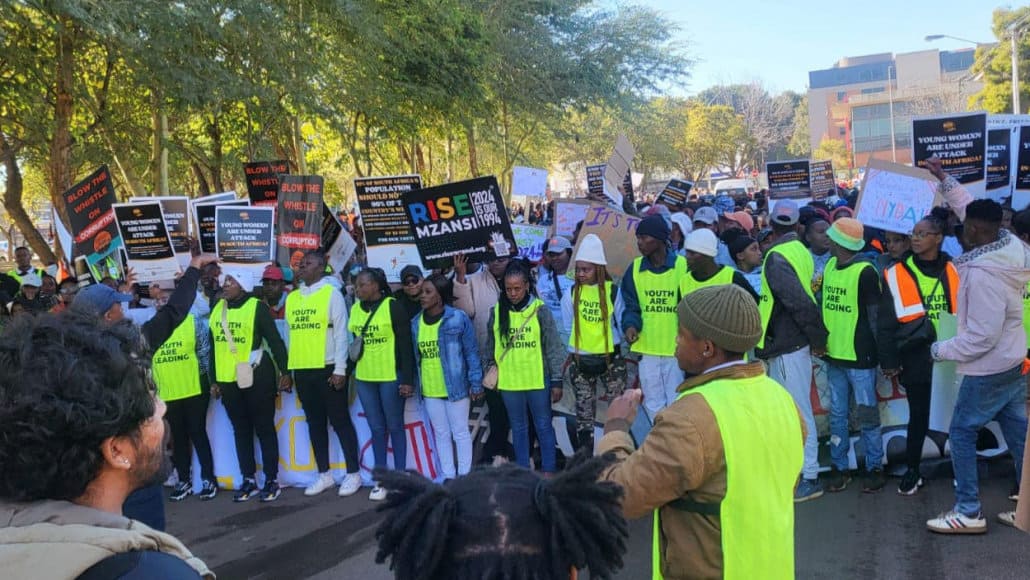By Kwazi Dlamini
Just like the youth of 1976 against the apartheid government, the plight of young people continues to fall on deaf governmental ears, 29 years into democracy.
The day is celebrated around the country to commemorate the schoolchildren who in 1976 marched against the introduction of Afrikaans as the medium of instruction in black schools under the apartheid government.
Last year, however, young people used the day to echo different problems they face today, handing over a memorandum to the office of the president on 16 June last year.
The government seems unmoved by issues detailed in the memorandum that affect young people in the country as it is yet to address any of the issued raised.
Youth taking the lead on youth matters
This year on 16 June the Ahmed Kathrada Foundation (AKF), in collaboration with close to 100 other organisations under the banner National Youth Coalition (NYC), mobilised young people and marched to the Union Buildings in Pretoria to express their unhappiness with the plethora of social issues affecting them – including crime, unemployment, corruption, and others.
It has been just over a year since the submission of that memorandum last year, but there has not been any form of feedback from the presidency, either in writing or in actively tackling the issues.
Irfaan Mangera from the AKF says this will not deter the organisation from holding these marches annually until their cries are heard. He says this year the coalition decided to switch things up, by not only raising the issues but also bringing solutions to these problems.
In this year’s follow-up memorandum, the coalition of organisations indicated to President Cyril Ramaphosa that their demands must be fully addressed by June 2026, which will mark the 50th anniversary of the 1976 uprising. Furthermore, the coalition has provided the decisive steps to implement a plan of action to improve the lives of young people in the country.
Let young people participate
One of the key demands is the meaningful engagement and participation of young people in decisions that affect their future. The memorandum indicates the frustration of young people for being disregarded, hence the calls for regular meetings between elected officials and the youth. These meetings will serve as a platform for officials to update the youth on the progress and action taken to address the demands served in the memorandum.
“The formation of NYC was created for young people to be able to convene and it continues to attract young activists across the country. This platform allows us to share our struggles and find new ways of addressing them. The growth in numbers of individuals and organisations is a clear indication and hunger for greater collaboration and solidarity-building work to define common areas of concern and ensure these are addressed by those in power,” Mangera emphasised.
The memorandum demands that the government decisively deal with rampant corruption and misuse of state funds through the protection of whistle-blowers when they report corruption. The coalition calls for a safe and secure process for public servants to report corruption and additional training for public servants on how to safely report maladministration. Investigations and audit reports must lead to consequences against the transgressors and for public servants to be held accountable.
The NYC further calls on government to capacitate the National Prosecuting Authority with the necessary resources for it to effectively prosecute public servants who engage in corrupt practices.
Crime against women and children a priority
The recent crime statistics, particularly crime against women and children, made the subject one of the priority issues to raise with the president. From January to March this year, the country saw over 6 000 murders and over 13 000 rapes reported. The NYC demands that the government establish strong preventative measures against gender-based violence and also ensure that perpetrators are suitably punished.
The coalition also wants the government to improve the way cases of gender-based violence are handled. It wants police officers to undergo extensive training to ensure that victims receive the necessary support. The government must work with public interest law groups to restructure the justice system to prioritise the well-being and safeguarding of victims while ensuring effective repercussions for perpetrators.
The memorandum further demands that government introduces a universal basic income guarantee to alleviate the levels of unemployment, particularly among young people. The universal basic income will not replace existing grants but will rather be distributed alongside them to improve the lives of those less privileged.
Presidential spokesperson Vincent Magwenya, together with the minister in the presidency for women, youth and people with disabilities, Nkosazana Dlamini-Zuma, both acknowledged, stamped, and signed the memorandum. They did not, however, indicate a time frame within which they would respond.
“The NYC will continue to apply pressure to obtain a response. This will be done through exhausting all communication channels and by engaging all other democratic processes to demand accountability,” Mangera said.

